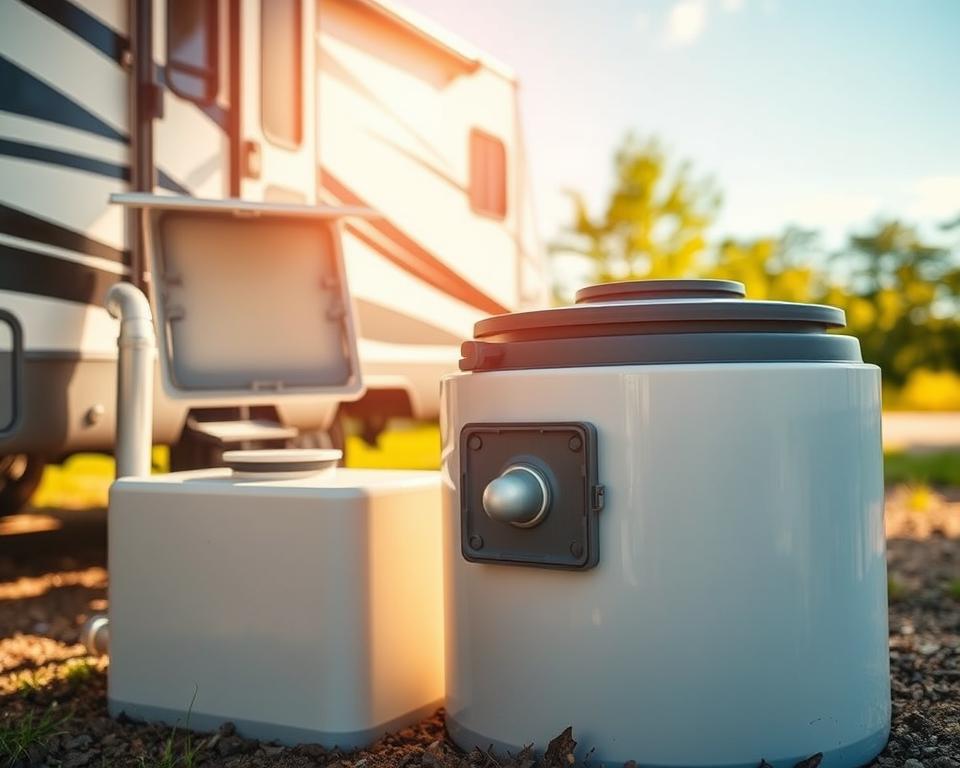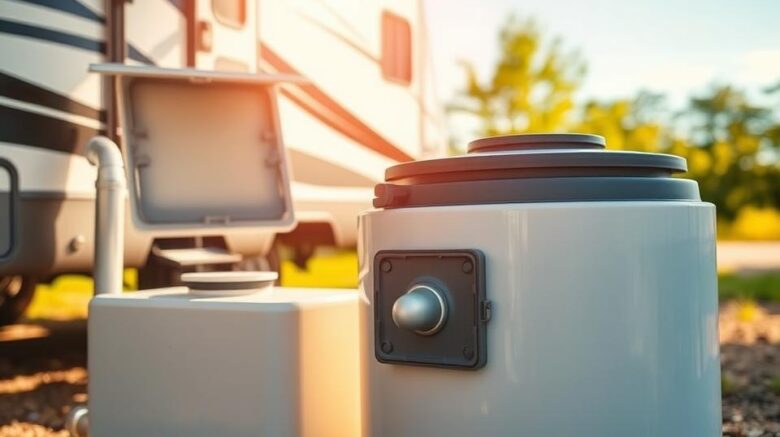RV Septic Pumping: A Manual to Effortless Disposal
Ever wondered about your RV’s waste management amid natural landscapes? Septic servicing matters greatly, more than you might suspect. It’s vital to have your motorhome’s waste system working well for seamless journeys. In this overview, we cover RV sewage setups, why tank emptying is necessary, and best practices for carefree adventures. With All in Sanitation’s expertise in RV tank pumping service, your trips can be as splendid as your destinations.
Summary Points
- Grasping RV sewage setups is essential for proper tank emptying.
- Regular septic pumping prevents unpleasant surprises during your travels.
- Following tips prolongs your motorhome’s pipework lifespan.
- Rely on All in Sanitation for dependable RV waste solutions.
- Knowing when to pump helps ensure a hassle-free camping experience.
- Eco-friendly dumping practices reflect good RV stewardship.
Understanding RV Waste Systems
On-the-go waste setups in RVs play a vital role in sanitation. They include black and gray water tanks. Black water tanks handle sewage from the bathroom. Meanwhile, gray tanks deal with wastewater from sinks and showers. Knowing their operations improves waste management in your RV.
It’s critical to maintain these systems properly. Failing to pump the camper tanks regularly may result in blockages. Potentially ruining your outdoor excursions. Ensure regular checks to keep both tank types functioning well.
Using a dependable black water service is key for proper tank emptying. Specialized RV treatments extend tank longevity and prevent odors. Maintaining your sanitation setup enriches your camping freedom.
The Importance of RV Tank Emptying
Regular RV septic pumping is vital for the hygiene and functionality of your motorhome. Neglecting wastewater management leads to foul smells, blockages, and system breakdowns. Accumulated waste poses health risks from bacteria. Thus, ongoing upkeep is indispensable.
Choosing All in Sanitation guarantees green, compliant dumping. They handle your sewage with care and precision. Staying on top of septic servicing keeps your trips worry-free. This practice preserves your adventures by sidestepping septic pitfalls.
Determining RV Pumping Frequency
How often you empty tanks influences your RV’s sanitation. It ensures your journey remains uninterrupted. Your pumping schedule depends on occupancy, tank capacity, and usage patterns.
If you camp sporadically, consider emptying black water tanks every few days. Full-time RV dwellers might need to pump more often due to more waste. Keeping an eye on your gauge refines your servicing schedule.
Chemical treatments are useful for determining when to pump. Following these guidelines protects your sanitation apparatus. Avoiding overflows preserves your RV’s plumbing and cleanliness.

RV Waste Emptying Techniques
Several effective methods exist for RV septic pumping, catering to different preferences. A macerator pump grinds waste into slurry to transform waste into liquid sludge. It enables smooth transfers to dump points. Its efficiency and convenience make it a popular choice.
Home septic dumping allows for emptying the RV’s holding tank directly into a residential septic system. Check local rules to ensure lawful dumping. This method is both environmentally safe and directly manages RV waste when properly used.
Gravity dumping uses gravitational force to release waste into a cleanout port, being the most straightforward method. Each method for RV septic pumping presents unique pros and cons. By understanding these, RV owners can select the most suitable option for their needs, ensuring effective waste management.
Essential RV Dumping Gear
Proper equipment makes tank emptying easier. A durable sewer hose links your RV to disposal sites. Flexibility and strength are crucial qualities. A good sewer hose simplifies waste disposal, making it less of a hassle.
Include a macerator pump in your gear list. These devices liquefy solid waste into a fine slurry, facilitating smoother transfers. Ideal for low-lying dump points.
Keep your waste tools in top condition. Rinse equipment after every job to prevent buildup. Proper storage guarantees readiness. Well-maintained gear ensures clean and smooth emptying.
Optimal RV Waste System Care
Maintaining a clean and efficient RV waste system is crucial for a pleasant travel experience. Adhere to these tips for spotless sanitation. Dump black tanks before gray to optimize rinsing. This process uses the cleaner water to flush out the tanks, preventing clogs and buildup.
It’s essential to use bacteria and enzyme treatments for effective wastewater management. These treatments naturally break down waste, fostering a healthier septic environment. Avoid bleach or strong cleaners that harm your septic’s helpful microbes.
Regular rinsing prevents odor and debris buildup. Use separate hoses for black water to reduce contamination risks. It minimizes contamination risks and aids in maintaining system cleanliness.
Follow this routine to streamline sewer cleaning:
- Dump black water first, then gray water.
- Apply microbial additives routinely.
- Steer clear of caustic cleaners.
- Flush all components post-dumping.
- Check valves and seals to catch leaks early.
By adopting these habits, campers enhance system longevity. This leads to more enjoyable road trip experiences.
Maintaining Your Mobile Home Septic
Similar to RVs, mobile homes need regular septic care for lasting performance. Regular upkeep prevents expensive repairs and guarantees a working septic system. A routine pump every 3–5 years suits most setups, based on usage and capacity.
Effective disposal methods are key to maintaining your septic system. Only introduce safe, approved substances into the system. Biodegradable solutions and level monitoring minimize harm. Steer clear of damaging cleaners that kill beneficial bacteria.
Scheduling regular professional inspections can catch potential problems early. Proactive inspections maintain seamless functionality. Adhering to these maintenance tips will ensure the septic system of your mobile home remains in excellent condition.
Trailer Wastewater Disposal Tips
Effective trailer wastewater disposal is essential for a smooth RV experience. Locate approved dumping spots before departure. Make sure these spots comply with local laws to avoid fines and environmental damage. Opting for RV-friendly products can enhance the tanks’ condition, facilitating efficient camper tank pumping.
Flushing with clean water helps clear tanks completely. A thorough rinse eliminates leftover sludge. This residue can cause odors and blockages. Plus, it aligns with green practices.
Advance planning is vital. By organizing your stops at disposal stations as per your travel plans, you can reduce hassle. This organization aids in streamlining the camper tank pumping process. Some useful tips for waste disposal include:
- Keep tabs on gauges to predict emptying times.
- Apply enzyme or bacteria-based solutions to decompose waste and boost tank performance.
- Always wear gloves and clean hands post-drainage gear handling.
What You Need to Know About Holding Tank Treatments
Efficient waste management in motorhomes relies heavily on proper RV holding tank treatment. These treatments are made with specific bacteria and enzymes. They aim to break down waste effectively. Consistent use curbs odors and keeps flow unobstructed.
Introducing beneficial bacteria treatments is vital for a balanced microbial environment in RV tanks. They accelerate the natural decomposition process. Less frequent emptying prolongs service intervals.
Choose additives suited to your rig’s specs. Products vary significantly. Eco-friendly options that work well with home septic systems are best. These choices maximize disposal efficiency and system health.
| Treatment Form | Active Ingredients | Benefits |
|---|---|---|
| Liquid Formulas | Bacteria and enzymes | User-friendly; powerful decomposition |
| Powder Treatments | Enzymes | Budget-friendly; durable |
| Tablet Treatments | Compressed bacteria | Hassle-free; exact dosing |
Septic Service Errors to Dodge
Many RV owners make errors during septic pumping that complicate waste management. Skipping regular pumping leads to surprises. Resulting in overflow and malfunctions. Misusing cleaners harms beneficial bacteria. This often results in expensive repairs due to the disruption of system operations.
Another common mistake is not following the correct order when dumping tanks. The sequence is crucial, especially for black water service. Failing to dump the black water before the gray can result in cross-contamination and foul odors. It’s also vital not to open the septic tank access lids during home dumping. This task should be left to professionals due to the inherent safety risks.
Moreover, neglecting equipment maintenance can cause leaks or clogs. Properly maintaining hoses and other essentials ensures an efficient and sanitary RV sewer cleaning process. Avoiding these pitfalls simplifies your outdoor experience. It also ensures a cleaner and safer environment for everyone involved.
To Summarize
An in-depth guide on RV septic pumping is vital for RV or mobile home owners. It makes road trips smoother. Regular maintenance and understanding your waste system can enhance your travels significantly. Employing correct methods and gear ensures stress-free camping.
Choosing All in Sanitation for septic services grants tranquility. Their professionalism guarantees that your wastewater management is in expert hands. Thus, you can immerse yourself in the joy of your travels and craft unforgettable moments.
Regular RV septic service is more than a mere task; it’s a cornerstone of responsible RV ownership. It merges adventure with an odor-free, clean campsite. This balance ensures a pleasant experience for you and your companions on every journey.
